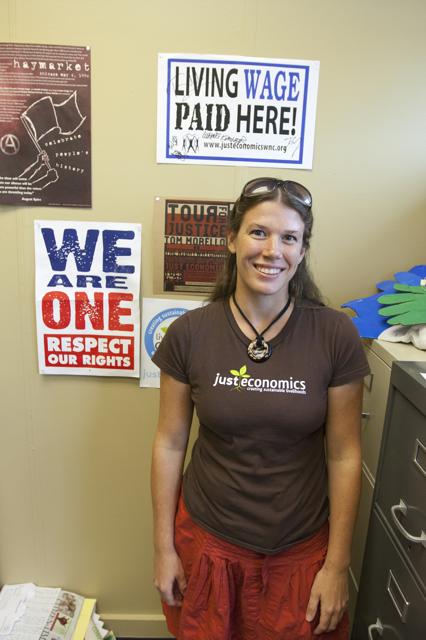- Making an impact: Mark Hebbard (left) and Vicki Meath of local nonprofit Just Economics advocate for businesses to offer employees better wages. photos by Jonathan Welch
- Bonnie Currie, a chocolatier and barista at the French Broad Chocolate Lounge, says that being paid a living wage helps inspire her to offer better customer service.
- Julia Stirling (left), a teacher at the Child Care Center of First Presbyterian Church, recently got a raise because the business opted to become living wage certified. Lisa Mangiardi (right), executive director of the center, thinks that the certification has helped employee moral.
Even in these tough times, local nonprofit Just Economics advocates for better wages. And they’re convincing small, regional businesses to make it happen.
The organization launched its Living Wage Certification Program in 2008, identifying and rewarding employers that pay a living wage — currently $11.35 per hour without health insurance or $9.85 per hour with it. Since then, more than 200 businesses have agreed to take part in the voluntary program, making it the largest of its kind in the country. In exchange for fulfilling certification requirements, Just Economics helps promote the companies in its marketing materials and campaigns, and empowers participants to do the same. Many have agreed to give their employees raises to qualify.
It's all part of the organization's mission to help "create a just and sustainable local economy in WNC," explains Mark Hebbard, who coordinates the nonprofit’s living wage certification program. Executive Director Vicki Meath thinks the high participation is a sign that the community is becoming more economically conscientious. "We have a lot of responsible, committed employers in this town," she explains. "We also have a conscious consumer base. We have more people in this town that understand we vote with our ballots once a year, but we vote with our dollars every single day."
The idea of the living wage, she says, is "that an individual should be able to meet their basic needs without public or private assistance." The minimum hourly rates are calculated by using the local cost of housing with the U.S. Department of Housing and Urban Development's standard that such costs should be no more than 30 percent of a person's gross monthly income. The national minimum wage of $7.25 an hour doesn't meet that standard; paying employees more gives them discretionary money to pump back in to the local economy, benefiting everyone, Meath maintains.
"Looking at the local economy overall, when more people are paid a living wage, then more money is circulated in that economy. If you make a living wage, you may be able to buy a pizza from the local pizza shop, that type of thing; then in turn that employer gets more money in their pocket," she says.
Good wages are good for business
Local business owners and managers who take part in the program say that offering their employees living wages makes good moral and economic sense.
Before starting her own home-cleaning business, Leslie Ellis says she cleaned local bed and breakfasts for $8 an hour. But that's "just not enough to get by," she reports. When it came time to decide what to pay others, the co-owner of Green Home Cleaning says she wanted to be more generous.
"Being a single parent myself, I know what it's like to work and not make enough money to survive. Just because I'm a business owner now doesn't mean I've forgotten that," she explains. "Cleaning someone's house is not the most glamorous work. You can get kind of resentful if you're only making $8 or $10 an hour."
Danny Keaton, owner of Danny's Dumpster, also cites employee morale as a key factor in deciding to join the program and pay higher wages than his competitors. The company hauls the compost and recyclable materials of about 65 restaurants in Hendersonville and Asheville, including The Green Sage, Posana Cafe and the Lexington Avenue Brewery.
"Our employees work hard, they deserve a living wage," he says. "It helps them move forward in life, and it creates a much better work environment when everyone's happy about what they're doing and their pay."
And in the long term, Keaton says he expects the wages to help his bottom line.
"As a small business, you have to look at every expense. … the guys we train, they start to learn the routes of what we do, and we don't want them constantly on the look out for another job. We want to keep them around, otherwise we're stuck training new people," he explains.
Happy employees, happy customers
Advocates with Just Economics say they're particularly proud of the work they've done to raise wages in the local child care and service industries — two areas that typically offer low pay even though employee happiness is often integral to good performance.
The Child Care Center of First Presbyterian Church recently opted to take the necessary steps to be certified, resulting in a raise of $1.25 per hour for teacher Julia Stirling, who's been working there for nearly three years.
"It helped me cover my bills: my rent, my electric, my phone, groceries. I've been very tight," she notes. "I already loved working here, but it has definitely made me a more happy camper getting a raise." The center also offers health insurance. That, says Stirling, "is a huge plus. Because I have asthma and buy medicine every month, and it helps with those costs."
Lisa Mangiardi, executive director of the center, believes that the certification has already "impacted us in wonderful ways."
"We feel it enhances the quality of work, their output, if they're happier here, if they feel they're getting appreciated here more than any other place," she says. And she reports that the child care center plans to expand this winter, hiring several new employees who will also make the living-wage minimum.
Meanwhile, Bonnie Currie, a chocolatier and barista at the French Broad Chocolate Lounge, says that being paid a living wage helps inspire her to offer better customer service. Currie, who’s 30 and has worked in the service industry since she was 18, reports that her current position is the highest paying job she's ever had.
"It helps morale. The people we work for really care about our health and well-being," she maintains. "If you're working somewhere, and you can't get your basic needs met, then you're not going to do as good of a job. And then the experience for the customers isn't going to be as good."
Changing the business culture
Despite the recent success, administrators with Just Economics acknowledge they face huge challenges rallying more employers to raise their wages.
Some of the area's biggest employers — Ingles Markets, Mission Health System and The Grove Park Inn Resort & Spa, to name a few, continue to pay many employees below the nonprofit’s minimum standards. But Just Economics prefers a positive approach to luring more businesses to take part, rather than negative campaigning against those who choose not to.
"It's amazing how many employers we have who are struggling but who understand what it means to the community and their employees to pay a living wage," says Meath, noting that the organization keeps a running list of participating businesses on its website (justeconomicswnc.org).
The organization also continues to fine-tune its certification process, and is finishing up a period of self-evaluation.
Spurred in part by a controversy that erupted in December over the certification of Buchi Kombucha, a business that makes fermented tea drinks, the nonprofit tightened its certifying standards and safeguards. To make sure participating businesses stay in compliance, Just Economics now reserves the right to conduct random audits. It also overhauled its system for determining whether independent contractors and other nontraditional employees are making a living wage. And it now requires all employers to sign a contract pledging not to take retaliatory action against an employee who raises a concern about wages and benefits. To further help protect whistleblowers, Just Economics also started offering a "concern form" on its website that maintains the anonymity of those who fill it out. (Buchi Kombucha is no longer certified, although its owners say they may reapply in the future.)
It's a revised trust-but-verify approach that Meath says will help the advocacy group accomplish its larger mission.
"We're always reviewing every little aspect of our program so we can be as transparent and accurate and fair as possible, to both employers and employees," she reports. "Our ultimate goal is to change the culture of business in Asheville, providing more sustainable livelihoods."
— Jake Frankel can be reached at 251-1333, ext. 115, or at jfrankel@mountainx.com.







Why is the most important part of this article at the end?
I also think this article should have specifically mentioned how the $11.35 an hour or $9.85 an hour wage is being paid to workers. These wages were not necessarily money, if you recall. The wages were often times a package of different things the employer him- or herself decided upon, and even included things like the value of a free place to park while they worked and the value of some free kombucha, which were things the worker may not even want or be able to use. How has this changed, if at all? This was a major point of criticism for some of us, and it should have been in this article.
Just enough to keep you off the dole, not enough to keep you warm *and* well-fed.
I don’t think the calculation/amount of the living wage has changed since 2008, when the program started, but the cost of living (food and rent, to name two) has skyrocketed since then.
It really ends up more an insult than anything else.
It sure seems like ‘Thad” has a personal vendetta against this business that goes beyond reason.
Why dont they go for more money, like maybe $100
per hour or something worthwhile?